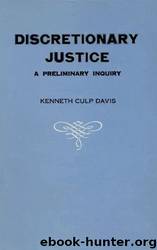DISCRETIONARY JUSTICE by Unknown

Author:Unknown
Language: eng
Format: epub
Published: 2019-11-17T16:00:00+00:00
V
Checking
Discretion
1. The principle of check. The American idea of “checks and balances,” primarily a constitutional doctrine involving the interrelation of the three departments of government, is also a practical idea that applies all the way down the line to the lowest clerks. What may be called “the principle of check” means simply that one officer should check another, as a protection against arbitrariness. The most usual checking authority is a superior of the officer who acts initially, who in turn may be checked by his superior in a hierarchical organization. But checking may also be effective when it is by a colleague on the same level, by one or more subordinates, by legislators to whom interested parties petition, by legislative committees or their staffs, by an official critic known as an ombudsman, by private organizations, by the press, by an administrative appellate tribunal, or by a reviewing court.
Paradoxically, the principle of check is often at its best when it is limited to correction of arbitrariness or illegality, and it may be relatively ineffective when it includes de novo review. This is because of the important fact, sometimes overlooked, that a de novo determination may itself introduce arbitrariness or illegality for the first time and not be checked, whereas a check may be limited to the one objective of eliminating arbitrariness or illegality, so that almost all final action is subject to a check for arbitrariness or illegality. The recognized superiority of a check to a de novo determination is one of the main reasons that the mainstay of judicial review of administrative action is a review of limited scope, not de novo review, although in some circumstances de novo review may be desirable.
Institutional decisions intrinsically involve the principle of check. A jury of twelve is better than a jury of one because the twelve check each other’s weaknesses, emotions, and idiosyncracies; a nine-judge court or a three-judge court is better than a one-judge court for the same reason. The National Labor Relations Board of five members may be better geared to dispensing discretionary justice than the Secretary of Labor—unless the secretary shares his deliberation with members of his staff, as he is likely to do; indeed, the secretary may assign a problem to a five-man group for deliberation and decision, subject to his review, and the protection against arbitrariness may be stronger than that provided by the NLRB’s system of five-man decision without independent executive review. Institutional decisions at their best draw much strength from their built-in systems of checks and balances. For instance, institutional decisions by a federal regulatory agency may draw from staff specialists of various kinds, with initial review by chiefs of the specialists; then more generalized staffs may integrate the reports from various specialist staffs, with review by their chief; the whole product may then be put through the minds of the agency’s top officers, who usually supply the broader perspective, including political considerations. The machinery for institutional decisions may thus invoke the principle of check at many points.
Download
This site does not store any files on its server. We only index and link to content provided by other sites. Please contact the content providers to delete copyright contents if any and email us, we'll remove relevant links or contents immediately.
| Africa | Americas |
| Arctic & Antarctica | Asia |
| Australia & Oceania | Europe |
| Middle East | Russia |
| United States | World |
| Ancient Civilizations | Military |
| Historical Study & Educational Resources |
Cat's cradle by Kurt Vonnegut(15355)
Pimp by Iceberg Slim(14507)
4 3 2 1: A Novel by Paul Auster(12392)
Underground: A Human History of the Worlds Beneath Our Feet by Will Hunt(12098)
The Radium Girls by Kate Moore(12028)
Wiseguy by Nicholas Pileggi(5786)
The Fire Next Time by James Baldwin(5445)
Perfect Rhythm by Jae(5403)
American History Stories, Volume III (Yesterday's Classics) by Pratt Mara L(5307)
Paper Towns by Green John(5191)
Pale Blue Dot by Carl Sagan(5008)
A Higher Loyalty: Truth, Lies, and Leadership by James Comey(4964)
The Mayflower and the Pilgrims' New World by Nathaniel Philbrick(4503)
The Doomsday Machine by Daniel Ellsberg(4490)
Killers of the Flower Moon: The Osage Murders and the Birth of the FBI by David Grann(4447)
The Sympathizer by Viet Thanh Nguyen(4390)
Too Much and Not the Mood by Durga Chew-Bose(4348)
The Borden Murders by Sarah Miller(4325)
Sticky Fingers by Joe Hagan(4198)
